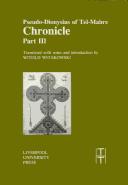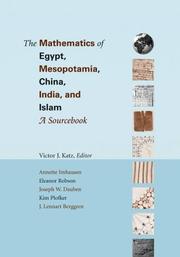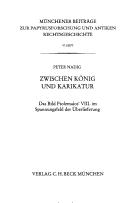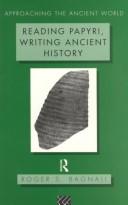| Listing 1 - 10 of 29 | << page >> |
Sort by
|

ISBN: 0853237603 9780853237600 Year: 1996 Volume: 22 Publisher: Liverpool: Liverpool university press,
Abstract | Keywords | Export | Availability | Bookmark
 Loading...
Loading...Choose an application
- Reference Manager
- EndNote
- RefWorks (Direct export to RefWorks)
Syria --- Syrie --- History --- Histoire --- History, Ancient --- History, Ancient - Sources
Book
ISBN: 9781905670567 1905670567 Year: 2015 Volume: 129 Publisher: London: University of London. Institute of classical studies,
Abstract | Keywords | Export | Availability | Bookmark
 Loading...
Loading...Choose an application
- Reference Manager
- EndNote
- RefWorks (Direct export to RefWorks)
History, Ancient --- Handley, E. W. --- History, Ancient - Sources
Book
ISBN: 3110710390 Year: 2020 Publisher: Berlin, Germany ; Boston, Massachusetts : De Gruyter,
Abstract | Keywords | Export | Availability | Bookmark
 Loading...
Loading...Choose an application
- Reference Manager
- EndNote
- RefWorks (Direct export to RefWorks)
Private associations organized around a common cult, occupation, ethnic identity, neighborhood or family were among the principal means of organizing social and economic life in the ancient Mediterranean. They offered opportunities for sociability, cultic activities, mutual support and contexts in which to display and recognize virtuous achievement. This volume collects 140 inscriptions and papyri from Ptolemaic and early Roman Egypt, along with translations, notes, commentary, and analytic indices. The dossier of association-related documents substantially enhances our knowledge of the extent, activities, and importance of private associations in the ancient Mediterranean, since papyri, unavailable from most other locations in the Mediterranean, preserve a much wider range of data than epigraphical monuments. The dossier from Egypt includes not only honorific decrees, membership lists, bylaws, dedications, and funerary monuments, but monthly accounts of expenditures and income, correspondence between guild secretaries and local officials, price and tax declarations, records of legal actions concerning associations, loan documents, petitions to local authorities about associations, letters of resignation, and many other papyrological genres. These documents provide a highly variegated picture of the governance structures and practices of associations, membership sizes and profiles, and forms of interaction with the State.
Ancient Sources. --- Social structure. --- Ancient Mediterranean. --- Social organization.

ISBN: 2701116511 9782701116518 Year: 1995 Publisher: Paris: Belin,
Abstract | Keywords | Export | Availability | Bookmark
 Loading...
Loading...Choose an application
- Reference Manager
- EndNote
- RefWorks (Direct export to RefWorks)
Historians --- History, Ancient --- Historiens --- Histoire ancienne --- Historiography --- Sources --- Historiographie --- Biography. --- Historians - Biography --- History, Ancient - Sources

ISBN: 9780691114859 0691114854 Year: 2007 Publisher: Princeton: Princeton university press,
Abstract | Keywords | Export | Availability | Bookmark
 Loading...
Loading...Choose an application
- Reference Manager
- EndNote
- RefWorks (Direct export to RefWorks)
Mathematical logic --- Mathematics, Ancient --- Mathematics --- History --- Mathématiques --- --Antiquité --- --Histoire --- --Sources --- --History --- Mathematics, Ancient - Sources --- Mathematics - History - Sources --- Antiquité --- Histoire --- Sources

ISBN: 9783406559495 3406559492 Year: 2007 Volume: 97 Publisher: Munchen: Beck,
Abstract | Keywords | Export | Availability | Bookmark
 Loading...
Loading...Choose an application
- Reference Manager
- EndNote
- RefWorks (Direct export to RefWorks)
Law --- Sources. --- Ptolemy --- Ptolemaic dynasty, --- Ptolemaios --- Historiography. --- Political satire --- History. --- Egypt --- History --- Kings and rulers. --- Law - Egypt, Ancient - Sources.

ISBN: 9780888442864 0888442866 Year: 1999 Volume: 36 Publisher: Toronto : Pontifical Institute of Mediaeval Studies,
Abstract | Keywords | Export | Availability | Bookmark
 Loading...
Loading...Choose an application
- Reference Manager
- EndNote
- RefWorks (Direct export to RefWorks)
History, Ancient --- Histoire ancienne --- Sources --- Dionysius --- Syria --- Syrie --- History --- Histoire --- Makhtevanuta --- Pseudo-Dionysius, --- History, Ancient - Sources --- Pseudo-Dionysius, - of Tel-Maḥrē, - active 8th century. - Makhtevanuta

ISBN: 0415093767 0415093775 9780415093774 Year: 1995 Publisher: London: Routledge,
Abstract | Keywords | Export | Availability | Bookmark
 Loading...
Loading...Choose an application
- Reference Manager
- EndNote
- RefWorks (Direct export to RefWorks)
History, Ancient --- Manuscripts (Papyri). --- Paleography. --- Historiography. --- Sources. --- Manuscripts (Papyri) --- Histoire ancienne --- Papyrus (Manuscrits) --- Historiography --- Sources --- Historiographie --- Handschriften (Papyri) --- Manuscrits (Papyrus) --- Papyri [Egyptian ] --- Paleography --- Handwriting --- Auxiliary sciences of history --- Writing --- Diplomatics --- Illumination of books and manuscripts --- Manuscripts --- Papyri, Egyptian --- Papyrus manuscripts --- Writing materials and instruments --- History [Ancient ] --- History, Ancient - Sources. --- History, Ancient - Historiography. --- History, Ancient - Sources
Book

ISSN: 00791687 ISBN: 9789004194229 9004194223 9789004194236 9004194231 1283120577 9786613120571 Year: 2011 Volume: 123 Publisher: Leiden : Brill,
Abstract | Keywords | Export | Availability | Bookmark
 Loading...
Loading...Choose an application
- Reference Manager
- EndNote
- RefWorks (Direct export to RefWorks)
Interest in Theophrastus, Aristotle's pupil and successor as head of the Peripatetic School, has increased considerably since the 1992 publication of Theophastus of Eresus: Sources for his Life, Works, Thought and Life . Now comes an extensive commentary on the ethical sources. It considers Theophrastus in relation to Aristotle, to other members of the Peripatos and to the Stoic philosophers who became Theophrastus' rivals. Special attention is given to Theophrastus' insistence that virtue by itself cannot guarantee happiness. Also to the difference between manners and moral virtue, the relation between innate character and fate, the value of marriage and how animal behavior relates to that of human beings.
Science, Ancient --- Philosophy, Ancient --- Philosophers --- Biography --- Sources --- Theophrastus --- Theophrastus. --- Scholars --- Ancient philosophy --- Greek philosophy --- Philosophy, Greek --- Philosophy, Roman --- Roman philosophy --- Ancient science --- Science, Primitive --- Science --- History --- Feofrast --- Theophrast --- Théophraste --- Theophrastos --- Teofrasto --- Theophrastus, --- Θεόφραστος --- Science, Ancient - Sources --- Philosophy, Ancient - Sources --- Philosophers - Greece - Biography - Sources
Multi
ISSN: 27407624 ISBN: 9782356680693 2356680691 2356681744 Year: 2020 Volume: 2 Publisher: Lyon: Maison de l'Orient et de la Méditerranée - Jean Pouilloux,
Abstract | Keywords | Export | Availability | Bookmark
 Loading...
Loading...Choose an application
- Reference Manager
- EndNote
- RefWorks (Direct export to RefWorks)
L'usage de versions abrégées des œuvres littéraires de tous les domaines, de l'ouvrage de botanique à l'ensemble de l'œuvre d'un historien comme Tite-Live, est extrêmement courant dans l'Antiquité. Ces résumés ont des formes variées, qui vont des « sommaires » (periochae) à la sélection d'extraits (épitomé), en passant, entre autres, par la paraphrase ; l'absence de cadre théorique, dans le monde gréco-romain, explique une telle diversité. Les contributeurs de ce volume se sont intéressés à des cas particuliers de résumés antiques, en s'interrogeant sur les pratiques à l'œuvre dans des domaines précis : les ouvrages scientifiques et techniques (médecine, astronomie, histoire) et le contexte rhétorique et scolaire (poésie, commentaires scolaires). Ils observent, chez les Anciens, un usage surprenant, pour le scientifique moderne, du résumé. En effet certains savants, en Grèce et à Rome, au cours de la rédaction d'un ouvrage, n'hésitent pas à puiser dans des résumés, et non dans les œuvres intégrales, tandis que d'autres vont jusqu'à ajouter des éléments aux sources qu'ils abrègent, voire à « réinventer » l'œuvre qu'ils résument. Dans le contexte scolaire, les résumés ont un rôle particulièrement important, dont les épitomateurs anciens sont souvent parfaitement conscients : les suppressions et les modifications manifestent une attention particulière à tel ou tel lectorat et le résumé a ses propres enjeux dans la transmission de toutes les formes de littérature.
Conferences - Meetings --- History, Ancient --- Civilization, Classical --- History --- Science, Ancient --- Language and culture --- Methodology --- History, Ancient - Sources - Congresses --- Civilization, Classical - Sources - Congresses --- History - Methodology - Congresses --- Science, Ancient - Sources - Congresses --- Language and culture - Greece - Congresses --- Language and culture - Rome - Congresses --- Classics --- Literature (General) --- résumé --- épitomé --- abrégé --- paraphrase --- poésie --- littérature scolaire --- médecine --- astronomie --- histoire --- summary --- epitome --- abstract --- poetry --- school litterature --- medicine --- astronomy --- Greece. --- Rome (Empire)
| Listing 1 - 10 of 29 | << page >> |
Sort by
|

 Search
Search Feedback
Feedback About UniCat
About UniCat  Help
Help News
News